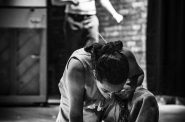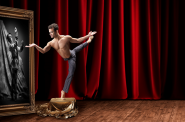Stravinsky’s Petrouchka
Stravinsky became the Stravinsky we know in Paris between 1910 and 1913.
During this period, Serge Diaghilev produced, his Ballets Russes staged, and Igor Stravinsky scored The Firebird, Petrouchka and The Rite of Spring. Michel Fokine choreographed Firebird and Petrouchka, and Vaslav Nijinsky choreographed the shocking Rite. All three caused sensations, and by the time the curtain came down on Rite, Stravinsky’s reputation as one of the most important composers of the century was firmly in place.
We’re taking a look back because the Milwaukee Symphony will perform Stravinsky’s 1947 revision of Petrouchka this week, under guest conductor Rossen Milanov.
Igor Stravinsky (1882-1971), son of an opera singer and relatively green composition student of Rimsky-Korsakov, had some good luck in 1907. Diaghilev (1872-1929), a St. Petersburg arts bureaucrat and monumentally ambitious private impresario, happened to hear some of Stravinsky’s student work and detected possibilities. Diaghilev commissioned some orchestral arrangements of Chopin, and Stravinsky came through. Timely completion of that task would change the young composer’s life.
In 1908 and 1908, Diaghilev staged a few concerts of Russian music and a big opera there. He had bigger plans for 1910. Diaghilev wanted to stage a blockbuster ballet with stars of the Maryinsky Theater. It would be a ballet steeped in Russian folk tradition. After several important composers turned him down, Diaghilev took a chance with Stravinsky. The result was Firebird. It incorporated the latest ideas in Art Nouveau/Orientalist design, and Fokine’s choreography was radical stuff for the time.
The hit prompted Diaghilev to order another ballet from Stravinsky, Rite. Instead, Stravinsky spent the allotted time in 1910 working on Petrouchka, written with the vague idea of a puppet in mind. Diaghilev went with what he had, delayed Rite, and put Fokine and designer/scenarist Alexander Benois to work on Petrouchka.
Encouraged by success, the team determined to push the boundaries harder. In its music, dance and design, Petrouchka would be riotous.
Fokine brushed aside the ranks of traditional ballet in favor of a vibrating mass of bodies at a Shrovetide street fair set in 1830 St. Petersburg. Street performers, including a dancing bear, would emerge from the crowd and melt back into it. Stravinsky responded with a score that shimmers with crowd noise and excitement, bristles with vertiginous gestures and is giddy with songs and dances that emerge and disappear in accord with the action. If the drama called for cacophony, Stravinsky would whip it up. Vibrant thrills trumped traditional beauty in Petrouchka from the ground up.
Stravinsky worked closely with Benois on the scenario, which involves the private lives and conflicts of three puppets and their master, the Magician. The central character, the sad-sack Petrouchka, is forever fated to lose the lovely, empty-headed Ballerina to the scimitar-wielding Blackamoor. Nijinsky’s rag-doll pathos in the title role is the stuff of ballet legend.
Ballet is a fragile thing, subject to distortion over time, but the Paris Opera Ballet did the world a service by going to great lengths to research and restore Petrouchka to the extent possible. Yes, it’s on video, and it’s grand.
The ballet dazzled Paris and audiences everywhere. It bowled them over with its audacity and won them over with its pathos and charm. Cyril Beaumont attended the London premiere in 1913, and recalls it in a 1975 memoir:
I well remember the startled expressions on the faces of the audience and my own surprise at the first hearing of Stravinsky’s music, so wonderfully expressive of the raucous sounds and bustling movements of a fair, but which then sounded incredibly daring and uncouth to ears attuned to the melodies of classic composers.
The success of Firebird and Petrouchka shaped Stravinsky in ways beyond fame and opportunity. It placed him in a circle of artists and intellectuals that gathered around Diaghilev. Among them were Proust, Gide, Paul Claudel and Sarah Bernhardt. All the important composers, including Ravel and Debussy, came to know him. Very soon, Picasso and Braque were at the table. From this point on, Stravinsky is part of an international artistic/intellectual elite and a famous man.
The music took on a life independent of the ballet. When the copyright was about to expire, in 1947, Stravinsky, always one with an eye on the bottom line, published a revised version of the piece meant just for concerts. The MSO will perform that version, which is the concert standard.
Also on this program: Tchaikovsky’s Piano Concerto No. 1, with soloist John Lill, and William Bolcom’s Commedia for (almost) 18th-century Orchestra. Concerts begin at 11:15 a.m. Friday and 8 p.m. Saturday, Feb. 12-13, at Marcus Center Uihlein Hall, 929 N. Water St. Tickets are $24-$77 for the Friday matinee and $25-$93 Saturday evening. Visit the MSO website, call the orchestra’s ticket line (414-291-7605), or call the Marcus box office, 414-273-7206.
Sources: The Rest Is Noise, by Alex Ross, Farrar Strauss Giroux, 2007; Reading Dance, by Robert Gottlieb, Pantheon, 2008; The Concise Oxford Dictionary of Ballet, Oxford University Press, 1977; Petrushka and the Orchestra, Tom Strini, unpublished paper, Graduate School of the University of California-San Diego, 1978.
Dance
-
New Riverwest Company, Production Impresses
 Feb 10th, 2020 by Brendan Fox
Feb 10th, 2020 by Brendan Fox
-
Milwaukee Ballet Show Remakes History
 Feb 10th, 2020 by Catherine Jozwik
Feb 10th, 2020 by Catherine Jozwik
-
Ballet Does Free Production of ‘Nutcracker’
 Dec 20th, 2019 by Richard Davis
Dec 20th, 2019 by Richard Davis




















